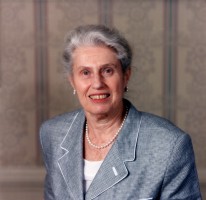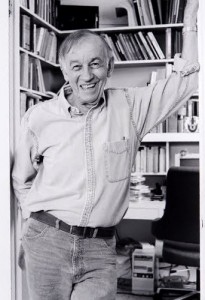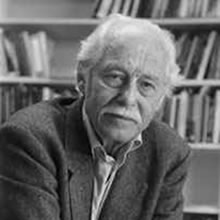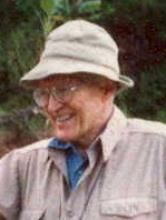In Memoriam
Within the space of a few months, the discipline of anthropology lost four major figures, who were also all a part of the history of the Foundation: Ernestine Friedl, Sidney Mintz, Frederik Barth, and Hal Conklin.
 Ernestine Friedl died in October 2015 at the age of 95. She was the first anthropologist to do a full-scale study of modern Greece and among the first to write on gender cross-culturally, proposing hypotheses about the determinants of women’s status in different societies. She had a long and distinguished career in academic administration, first in the City University of New York and then at Duke University, where she became the first woman appointed as Dean of the faculty. She was elected as president of several professional organizations, including the American Anthropological Association. A long-time friend of the Foundation, Friedl served on the Advisory Council (1987-1991) and subsequently as an advisor to the Board of Trustees.
Ernestine Friedl died in October 2015 at the age of 95. She was the first anthropologist to do a full-scale study of modern Greece and among the first to write on gender cross-culturally, proposing hypotheses about the determinants of women’s status in different societies. She had a long and distinguished career in academic administration, first in the City University of New York and then at Duke University, where she became the first woman appointed as Dean of the faculty. She was elected as president of several professional organizations, including the American Anthropological Association. A long-time friend of the Foundation, Friedl served on the Advisory Council (1987-1991) and subsequently as an advisor to the Board of Trustees.
 Sidney W. Mintz died in December 2015 at 93. He had been a professor at Johns Hopkins University, whose anthropology department he founded. One of the principal figures in bringing a historically rooted political economy into anthropology, he was known especially for his groundbreaking research on proletarian populations in the Caribbean, based on his fieldwork in islands of all three of the area’s major languages. His signature work, Sweetness and Power, was a global view of the connections between the development of empires, slavery, commodity production, and consumer taste. He is also considered the founder of food anthropology. Mintz participated in four International Symposia, where he was memorable for his acumen and wit, and he received four small grants, including one that enabled crucial archival research on sugar in the British diet. (Photo: Johns Hopkins U, Homewood)
Sidney W. Mintz died in December 2015 at 93. He had been a professor at Johns Hopkins University, whose anthropology department he founded. One of the principal figures in bringing a historically rooted political economy into anthropology, he was known especially for his groundbreaking research on proletarian populations in the Caribbean, based on his fieldwork in islands of all three of the area’s major languages. His signature work, Sweetness and Power, was a global view of the connections between the development of empires, slavery, commodity production, and consumer taste. He is also considered the founder of food anthropology. Mintz participated in four International Symposia, where he was memorable for his acumen and wit, and he received four small grants, including one that enabled crucial archival research on sugar in the British diet. (Photo: Johns Hopkins U, Homewood)
 Frederik Barth died in January 2016 at 87. The founder of the first department of social anthropology in Scandinavia (in Bergen, Norway), he was enormously influential in both Europe and North America for his processual theories, which stressed agency over structure. His treatment of ethnicity as a matter of fluid identities and shifting boundaries stood in contrast to the then-prevailing focus on ethnic groups. A prolific and courageous ethnographer, he carried out fieldwork in Iran, Pakistan, Sudan, Papua New Guinea, Oman, Bali, and Bhutan. Wenner-Gren played an important part in Barth’s work. The conference on “Scale and Social Organization” that he organized at Burg Wartenstein yielded a pioneering volume, and he was a participant in six other International Symposia. Several of the nine small grants he received supported his diverse field research.
Frederik Barth died in January 2016 at 87. The founder of the first department of social anthropology in Scandinavia (in Bergen, Norway), he was enormously influential in both Europe and North America for his processual theories, which stressed agency over structure. His treatment of ethnicity as a matter of fluid identities and shifting boundaries stood in contrast to the then-prevailing focus on ethnic groups. A prolific and courageous ethnographer, he carried out fieldwork in Iran, Pakistan, Sudan, Papua New Guinea, Oman, Bali, and Bhutan. Wenner-Gren played an important part in Barth’s work. The conference on “Scale and Social Organization” that he organized at Burg Wartenstein yielded a pioneering volume, and he was a participant in six other International Symposia. Several of the nine small grants he received supported his diverse field research.
 Harold Conklin died in February 2016 aged 89. Associated with Yale University for many years, he was a linguist and a cultural anthropologist with special distinction in ethnoecology, the study of indigenous ways of knowing the natural world. He was interested in Native Americans from an early age, in fact was adopted into the Mohawk Nation while still in elementary school. He did extensive and important fieldwork in the Philippines, first with the Hanunoo; his article on their way of categorizing color became a founding entry into a new field, ethnoscience. He then began his long-term research with the Ifugao and became their foremost interpreter. His ethnographic atlas on Ifugao environment and culture, supported in part by a Wenner-Gren grant, became a landmark of meticulous documentation. He received seven other grants and participated in two conferences at Burg Wartenstein. Conklin was a devoted friend of the Foundation. He served on the Advisory Council (1986-1990) but was also an indispensable informal advisor to two presidents.
Harold Conklin died in February 2016 aged 89. Associated with Yale University for many years, he was a linguist and a cultural anthropologist with special distinction in ethnoecology, the study of indigenous ways of knowing the natural world. He was interested in Native Americans from an early age, in fact was adopted into the Mohawk Nation while still in elementary school. He did extensive and important fieldwork in the Philippines, first with the Hanunoo; his article on their way of categorizing color became a founding entry into a new field, ethnoscience. He then began his long-term research with the Ifugao and became their foremost interpreter. His ethnographic atlas on Ifugao environment and culture, supported in part by a Wenner-Gren grant, became a landmark of meticulous documentation. He received seven other grants and participated in two conferences at Burg Wartenstein. Conklin was a devoted friend of the Foundation. He served on the Advisory Council (1986-1990) but was also an indispensable informal advisor to two presidents.
Sydel Silverman
President Emerita, Wenner-Gren Foundation